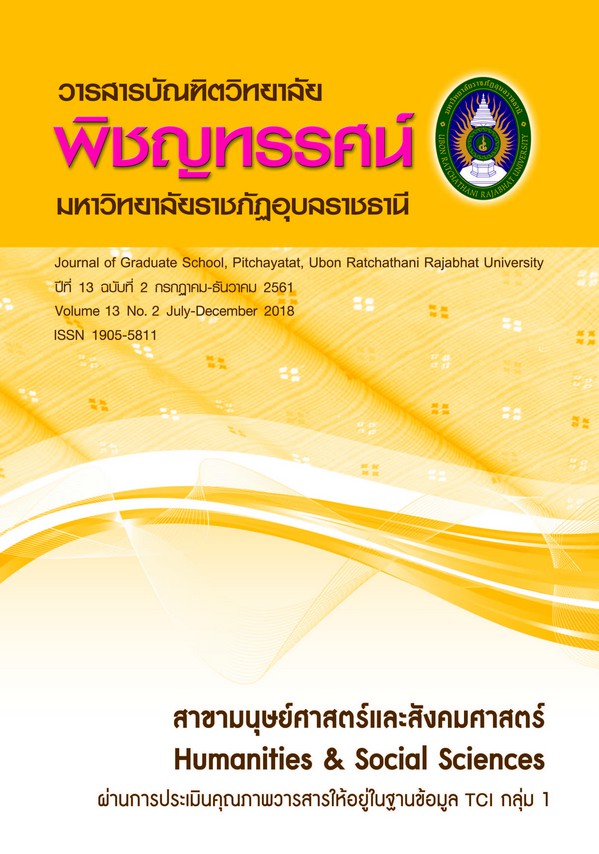ความคิดเห็นต่อความก้าวร้าวในการใช้สื่อสังคมออนไลน์ของนิสิตระดับปริญญาตรี มหาวิทยาลัยมหาสารคาม
คำสำคัญ:
เจตคติ, การรับรู้, ความก้าวร้าวในการใช้สื่อสังคมออนไลน์บทคัดย่อ
การศึกษาครั้งนี้มีวัตถุประสงค์เพื่อศึกษาเจตคติต่อความก้าวร้าวในการใช้สื่อสังคมออนไลน์และการรับรู้ความก้าวร้าวในการใช้สื่อสังคมออนไลน์และเพื่อเปรียบเทียบเจตคติต่อความก้าวร้าวในการใช้สื่อสังคมออนไลน์และการรับรู้ความก้าวร้าวในการใช้สื่อสังคมออนไลน์ของนิสิตระดับปริญญาตรี มหาวิทยาลัยมหาสารคาม โดยจำแนกตามเพศและบุคลิกภาพ โดยตัวอย่างที่ใช้ในการวิจัย ได้แก่ นิสิตระดับปริญญาตรี ปีการศึกษา 2560 จำนวน 800 คน ได้มาโดยวิธีการสุ่มตัวอย่างแบบหลายขั้นตอน เครื่องมือที่ใช้ในงานวิจัย คือ แบบวัดบุคลิกภาพ แบบวัดเจตคติต่อความก้าวร้าวในการใช้สื่อสังคมออนไลน์ของนิสิตปริญญาตรี มหาวิทยาลัยมหาสารคามและแบบวัดการรับรู้ความก้าวร้าวในการใช้สื่อสังคมออนไลน์ของนิสิตปริญญาตรี มหาวิทยาลัยมหาสารคาม มีค่าความเชื่อมั่นเท่ากับ 0.93, 0.84 และ 0.83 ตามลำดับ สถิติที่ใช้ในการวิจัย คือ ร้อยละ ค่าเฉลี่ย ส่วนเบี่ยงเบนมาตรฐาน และการวิเคราะห์ความแปรปรวนพหุคูณทางเดียว ผลการวิจัยพบว่า 1. เจตคติต่อความก้าวร้าวในการใช้สื่อสังคมออนไลน์ และการรับรู้ความก้าวร้าวในการใช้สื่อสังคมออนไลน์ของนิสิตระดับปริญญาตรี มหาวิทยาลัยมหาสารคาม ในภาพรวมพบว่า ด้านเจตคติต่อความก้าวร้าวในการใช้สื่อสังคมออนไลน์นิสิตอยู่ในระดับสูง (= 3.93, SD = 0.53) และการรับรู้ความก้าวร้าวในการใช้สื่อสังคมออนไลน์ ในภาพรวม พบว่า นิสิตมีการรับรู้ความก้าวร้าวในการใช้สื่อสังคมออนไลน์อยู่ในระดับสูง (
= 3.85, SD = 0.59) 2. การเปรียบเทียบเจตคติต่อความก้าวร้าวในการใช้สื่อสังคมออนไลน์ และการรับรู้ความก้าวร้าวในการใช้สื่อสังคมออนไลน์ของนิสิตระดับปริญญาตรี มหาวิทยาลัยมหาสารคาม โดยจำแนกตามเพศและบุคลิกภาพ พบว่า เพศหญิง (
= 3.97, SD = 0.49) มีเจตคติต่อความก้าวร้าวสูงกว่าเพศชาย (
= 3.88, SD = 0.57) อย่างมีนัยสำคัญทางสถิติที่ระดับ .05 ด้านการรับรู้ในการใช้สื่อสังคมออนไลน์ของทั้งนิสิตเพศชายและเพศหญิงเพศมีการรับรู้ไม่แตกต่างกัน ส่วนนิสิตที่มีบุคลิกภาพแบบเปิดเผยและบุคลิกภาพแบบเก็บตัวมีเจตคติต่อความก้าวร้าวในการใช้สื่อสังคมออนไลน์และการรับรู้ความก้าวร้าวในการใช้สื่อสังคมออนไลน์ของนิสิระดับปริญญาตรี มหาวิทยาลัยมหาสารคามไม่แตกต่างกัน
เอกสารอ้างอิง
ภูเบศร์ สมุทรจักร และ กุลทิพย์ ศาสตระรุจ. เหวี่ยงและวีนออนไลน์...ความขัดแย้งและการวิวาทในสื่อสังคมของวัยรุ่น. การประชุมวิชาการระดับชาติครั้งที่ 11: กรุงเทพฯ, 2558.
วิมลทิพย์ มุสิกพันธ์ และ ศิวพร ปกป้อง. ปัจจัยที่มีผลต่อทัศนคติและพฤติกรรมการกระทำความรุนแรงทั้งทางกายภาพและการข่มแหงรังแกผ่านโลกไซเบอร์ของเยาวชนไทย. กรุงเทพฯ: มหาวิทยาลัยมหิดล, 2553.
สุรางค์ โค้วตระกูล. จิตวิทยาการศึกษา. พิมพ์ครั้งที่ 9. กรุงเทพฯ: สำนักพิมพ์จุฬาลงกรณ์ มหาวิทยาลัย, 2553.
อภิญญา เฟื่องฟูสกุล. อัตลักษณ์การทบทวนแนวคิดและกรอบแนวคิด. กรุงเทพฯ: สำนักงานคณะกรรมการวิจัยแห่งชาติ, 2546.
Costa Jr, P., Terracciano, A. and McCrae, R. R. Gender differences in personality traits across cultures: robust and surprising findings. (Online) 2001 (Cited 2017 September 15). Available from: https://www.researchgate.net/
Daphna, J., et al. Sex Beyond the Genitalia: The Human Brain Mosaic. Proceedings of the National Academy of Sciences. 112, 50 (2015):15468-15473.
Donath, J. S. Identity and deception in the virtual community. Communities in cyberspace, (Online) 1999 (Cited 2017 September 12). Available from: https://s3.amazonaws.com/
Mitja D. Back. and others. Facebook Profiles Reflect Actual Personality,Not Self-Idealization. Psychological Science. 21, 3 (2010): 372-374.
Vandebosch, H., and Van Cleemput, K.Defining cyberbullying: A qualitative research into the perceptions of youngsters. CyberPsychology & Behavior. (Online) 2008 (Cited 2017 September 30). Available from: https://s3.amazonaws.com/
Mitja D. Back. and others. Facebook Profiles Reflect Actual Personality,Not Self-Idealization. Psychological Science. 21,3 (January 29, 2010): 372-374.
ดาวน์โหลด
เผยแพร่แล้ว
รูปแบบการอ้างอิง
ฉบับ
ประเภทบทความ
สัญญาอนุญาต
บทความทุกเรื่องได้รับการตรวจความถูกต้องทางวิชาการโดยผู้ทรงคุณวุฒิภายนอกอย่างน้อย 3 คน ความคิดเห็นในวารสารพิชญทรรศน์เป็นความคิดเห็นของผู้นิพนธ์มิใช่ความคิดเห็นของผู้จัดทำ จึงมิใช่ความรับผิดชอบของวารสารพิชญทรรศน์ และบทความในวารสารพิชญทรรศน์สงวนสิทธิ์ตามกฎหมายไทย การจะนำไปเผยแพร่ต้องได้รับอนุญาตเป็นลายลักษณ์อักษรจากกองบรรณาธิการ





